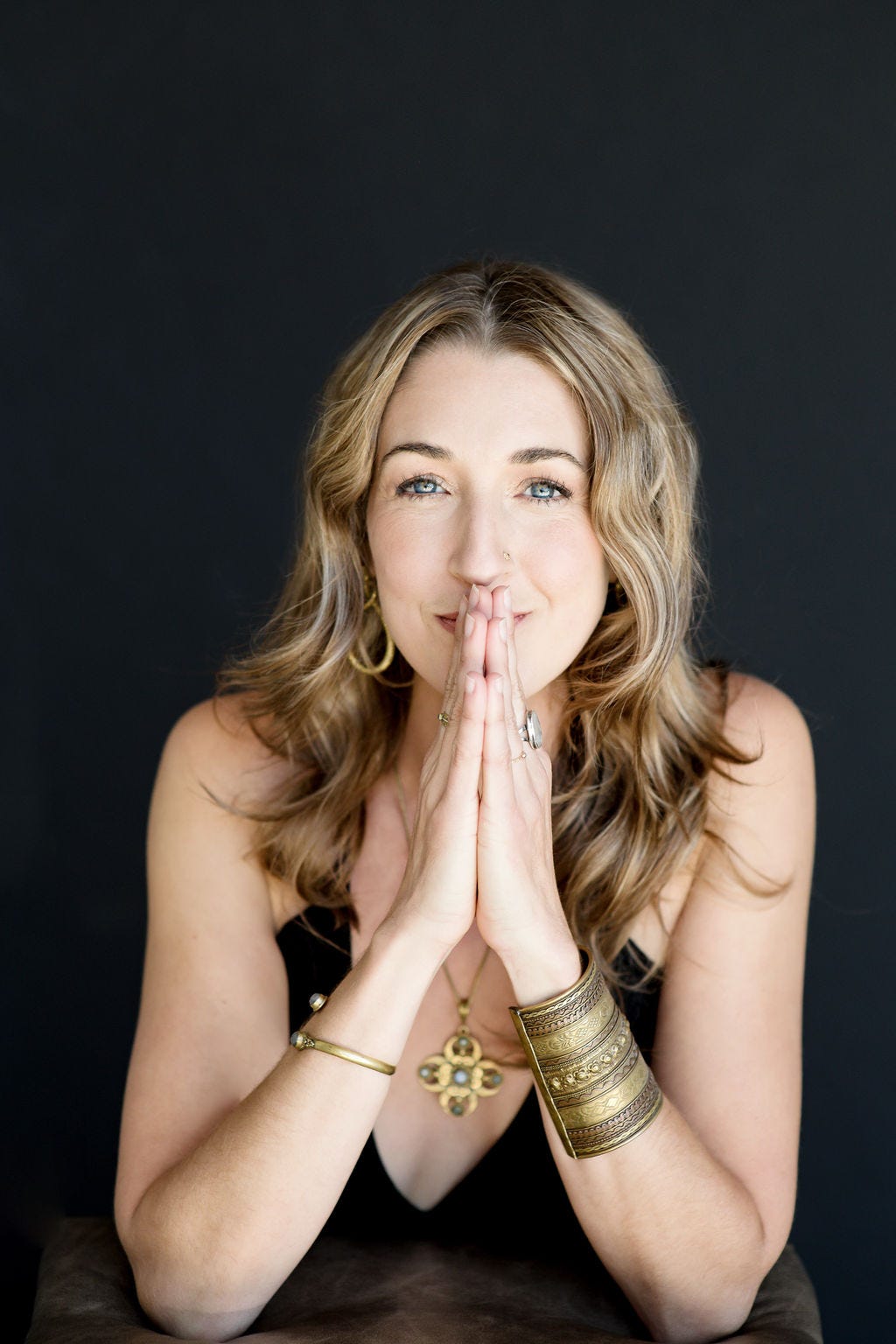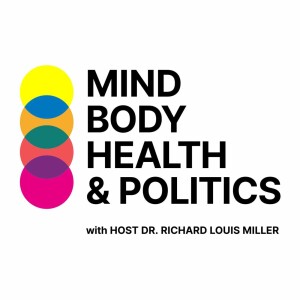
Dear listeners,
Why is that conversations about the most important issues are always the hardest to have? Why do we struggle to have meaningful heart-to-hearts with our loved ones about life and death, pleasure and pain, sexuality and psychedelic medicines?
In my own life, I’ve tried to be as open about these topics as possible, but I’ve often encountered resistance – both internal and external. Every once in a while, however, I find someone who is so open and honest in their manner of speaking that even I am caught off guard as I’m drawn into new depths of awareness about myself and my relationships with other people. This week’s episode features that kind of conversation.
Leslie Grace, RN, is a transformational coach and psychedelic integration guide who works with leaders, entrepreneurs, and visionaries to unlock their life force so they can become powerful, inspired agents of change. Her work incorporates psychedelic healing, Hakomi somatic therapy, and conscious sexuality practices and is informed by her background in Vajrayana Tibetan Buddhism. Leslie gratefully escaped her Catholic upbringing and former career as a Registered Nurse in end-of-life care to be drawn into the world of plant medicine and has never looked back. With 15 years of intentional psychedelic exploration, her primary authority is her own intuition. She lives in the San Francisco Bay Area and offers both private and group transformational containers. Expand your possibilities by getting in touch at timelesswisdom@protonmail.com.
Our interview covers a range of fascinating topics, from hospice work and end-of-life transitions to tantric education and psychedelic sexuality.
Grace shares her personal experiences and insights on approaching death with open arms, the power of sexual energy, and the journey to sexual empowerment. She also teaches us about a practice called the “Five Minute Game,” which you will want to try with your partner as a way of unlocking new levels of sexual pleasure.
Don’t miss this episode, and join our tribe of premium subscribers if you would prefer to read the transcript.
Golden light,
Dr. Richard L. Miller
The podcast and abbreviated notes are always freely available thanks to our paid subscribers. Please share this post to show your support for transparency.
Links and references:
* Connect with Leslie Grace: Facebook / Instagram / Email
* Hakomi Institute
* SAGE Institute
* Integral Psychedelic Therapy: The Non-Ordinary Art of Psychospiritual Healing
Summary
Introduction Democracy and Republic
00:00:00 - The importance of maintaining awareness and the right to vote for the preservation of democracy and republic.
Hospice Work
00:03:35 - Introduction of Leslie Grace and her multiple roles, including being a nurse and hospice worker, and in helping people transition.
00:10:28 - Leslie's experience with a patient who wanted a shaman from an ayahuasca circle to come and help him transition.
00:11:42 - The importance of making peace with family and loved ones and approaching death with open arms.
00:12:46 - Leslie's experience with a patient who had a peaceful and elegant transition.
00:14:23 - The use of morphine to help patients relax into the experience.
Tantric Education
00:15:57 - Leslie's personal story of her quarter life crisis and her journey to becoming a tantric educator.
Hands-On Teaching of Sexuality
00:31:27 - Leslie Grace describes hands-on teaching of sexuality and her experience with tantric massage.
Repression of Sexuality
00:41:04 - Leslie Grace talks about the repression of sexuality by religion, specifically Catholicism, and her personal journey to unravel her relationship with the church and allow herself to be more expressed.
00:42:34 - Dr. Miller discusses his theory on penetration and dominance in sexual intercourse; Leslie Grace responds and discusses conscious sexuality.
Adverse Effects and Safety
00:50:44 - Discussion on psychedelic medicine and Leslie Grace's work as a psychedelic guide; Dr. Miller asks about adverse effects and checklists for vetting clients.
01:01:51 - Discussion on different types of psychedelic therapeutic experiences and which medicines are being used predominantly.
Seeking Psychedelic Testimonials: The Good, the Bad, and the Ugly.
We are currently looking for first-hand accounts of adverse effects of psychedelics—from ‘bad trips,’ to unwanted physiological complications, to abusive practices by guides, therapists, and shamans.
The interviews from this series will go into a forthcoming book on the topic—perhaps the first book its kind.
Please contact me if you would like to be interviewed.
Mind Body Health & Politics is a reader-supported publication. To receive new posts and support my work, consider becoming a free or paid subscriber.
Transcript
Within the below transcript, the bolded text is Dr. Richard L. Miller, and the regular text is Leslie Grace. Edited transcript provided by Vergili.us – the podcast → prose publishers.
King of the Hill
Welcome to Mind Body, Health and Politics. I'm your host, Dr. Richard Louis Miller. Our mission at Mind Body, Health and Politics is to enhance your physical and emotional well-being, and to encourage community. I believe that encouraging community is essential for our health and well-being, as human beings are essentially friendly and tribal animals. When we hang out together in small enough groups, where we know everyone by name or at least by face, we collaborate, cooperate and accomplish wonderful things together. Whether it's sewing circles, watching games, playing games, bicycle riding or eating, we love doing these things together in groups. It's very tribal. More recently, we have also enjoyed doing psychedelic medicines together, such as Ayahuasca circles. However, while we recognize how friendly and tribal our species is, we must also acknowledge that there is a small percentage of us who are markedly different.
These are the people who, in the caves, played "king of the hill," and eventually became the heads of tribes, countries, and even dictators. They prefer to have us as subjects rather than citizens. Throughout history, we see examples of this, such as the Pharaohs who kept most of their people in slavery, while the top 1% enjoyed their wealth. Caesar changed the Roman Republic into an empire and was the dictator. Napoleon, Putin, and even Donald Trump, if he were to be re-elected, are all examples of these types of people. It is crucial that we maintain our awareness and right to vote, especially during these hard times when 70% of the United States is living paycheck to paycheck. We cannot let our country lose its democracy and republic, where one person has one vote and no one is above the law. Thomas Jefferson once said, "eternal vigilance is the price of liberty."
Hospice Work
On this episode of Mind, Body, Health and Politics, I am happy to have Leslie Grace as our guest. Leslie has worn many hats throughout her career, such as being a nurse, hospice worker, and working in psychedelic healing with somatic therapy, Tantra, and conscious sexuality. She has also worked with Hakomi, which she will tell us more about today. Welcome to Mind Body, Health and Politics, Leslie.
Thank you so much, Richard. It's a real delight to be here, and so curious which way our conversation will end up going.
Well, you have accomplished so many things. I hardly know where to begin, but let's start by going back to when you worked as a nurse and hospice worker. Please share some of your experiences with people going through end-of-life transitions. Tell us about their emotional state and what you learned about them.
Yeah, this was a really important time in my life. I think that working with death or being close to death and really appreciating that process and all its different facets really deepens us and changes us as human beings. It was a really meaningful time in my life. I knew I wanted to become a nurse to help people, to heal and make them feel more whole. I ended up in intensive care because it was the most critical care, and I became fascinated by what we could do with modern medicine. At the same time, it was heartbreaking to see people in such challenging states being kept alive on machinery, many of whom didn't have much of a prognosis to survive.
As nurses, we would talk to the doctors about the patients' chances, and oftentimes they would keep people going because they weren't sure how to have the conversation with the family that the patient didn't have much chance of having a good quality of life or bouncing back. I felt like it was good work and I was serving people, but my heart was a little broken over how long we would keep people in there only to have them eventually pass away. We did see people make it and go on to be healthy. After working in that area for a little while, I decided to move into hospice work.
More Episodes
 2022-08-18
2022-08-18
 2022-05-31
2022-05-31
 2022-05-17
2022-05-17
 2022-05-10
2022-05-10
 2022-05-03
2022-05-03
 2022-04-26
2022-04-26
 2022-04-05
2022-04-05
 2022-03-08
2022-03-08
Create your
podcast in
minutes
- Full-featured podcast site
- Unlimited storage and bandwidth
- Comprehensive podcast stats
- Distribute to Apple Podcasts, Spotify, and more
- Make money with your podcast
It is Free
- Privacy Policy
- Cookie Policy
- Terms of Use
- Consent Preferences
- Copyright © 2015-2024 Podbean.com






